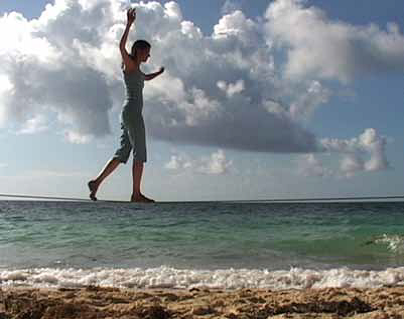
ththe Studio Museum of HarleThis article reviews the large-scale exhibition, Caribbean: Crossroads of the World. Located in New York, the exhibition stretches across three museums (The Studio Museum in Harlem, The Queens Museum, and El Museo del Barrio). The Director of The National Art Gallery of The Bahamas, Amanda Coulson reviews the overall exhibition and details her experiences with each institution.
Escaping Nassau for New York City didn’t mean escaping heat and humidity, but the trip was refreshing for other reasons, mainly the broad range of art shows on view at various art institutions. At The Metropolitan Museum alone I was able to cross centuries, experiencing the Italian Renaissance at the show Bellini, Titian, and Lotto, Modernism in the Elsworth Kelly: Plant Drawings show, and catch up with the contemporary world with at the superb exhibitions, Spies in the House of Art: Photography, Film, and Video.
One of the main reasons I spent time racing around the sweaty city, was to catch the exhibition, entitled, Caribbean: Crossroads of the World. Following shows such as Infinite Island at the Brooklyn Museum and Wrestling with the Image at the Art Museum of the Americas in Washington D.C., this exhibition underscores the current fascination with the Caribbean and will, hopefully, pave the way for more international shows that will, perhaps, go even deeper into reflecting Caribbean art practices in general and hopefully, The Bahamas in particular.
As mentioned, the show was very ambitious in its range but perhaps this was also its flaw. Each institution- The Studio Museum in Harlem, The Queens Museum, and El Museo del Barrio—has very definitive mandates, which slightly colored their individual views of the region. Each show also has its own ethos, causing a certain amount of crossover or repetition. This gave a very strong profile to each segment of the show but at the same time, also made them feel disconnected from one another. Somehow, this is actually a reflection of the Caribbean itself, both its strength and its weakness: we are diverse from country to country, island to island; we share histories but are culturally, ethnically and linguistically divided. It’s confusing, complicated and makes the Caribbean hard to pigeonhole. Crossroad’s attempt to portray the history and development of fine art in
the region was an extremely good start and should be applauded for its
range and scale and for bringing the region together under one banner.

Stuffed Swan, 2012
Marlon Griffin
Performance Art and Mixed Media
On display at the Queens Museum of Art
Image courtesy of artist and the Queens Museum of Art
“Where were the Bahamian artists?” I hear you ask. The Queens Museum is the answer! The good news is that The Bahamas was represented; the bad news is it skimmed the surface and some of the works were hung in rather odd corners. The best moment for me was walking into the Museum and being hit by a mermaid piece by Amos Ferguson, which opened the whole show. I took a photo with my iPhone and was (naturally and rightly so) told off by a museum guard. I did give them my card and they allowed me to photograph the other Bahamian works on show (no flash!).

The Three Sisters, 1980
Amos Ferguson
House Paint on Board
On display at the Queens Museum of Art
Image courtesy of The Studio Museum of Harlem
One of the sections at the Queens Museum was Kingdoms of the World whose aim was to consider the spiritual practices, beliefs, art forms and religions that coexist in the region. Carnival was a large factor and this is where the 4 Brent Malone etchings were, though no real explanation of Junkanoo was given.

Jonkonnu Ribbons (1993) and Untitled (1986),
Brent Malone
Etchings
On display at the Queens Museum of Art
Image courtesy of Queens Museum of Art and The Elizabeth Foundation of the Arts
Further Reading:
NY Times Article on Caribbean: Crossroads of the World
El Museo Del Barrio New York
The Studio Museum
Queens Museum Of Art